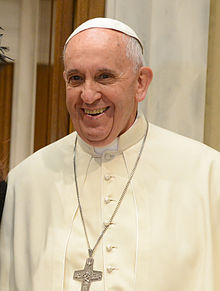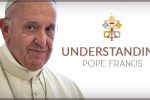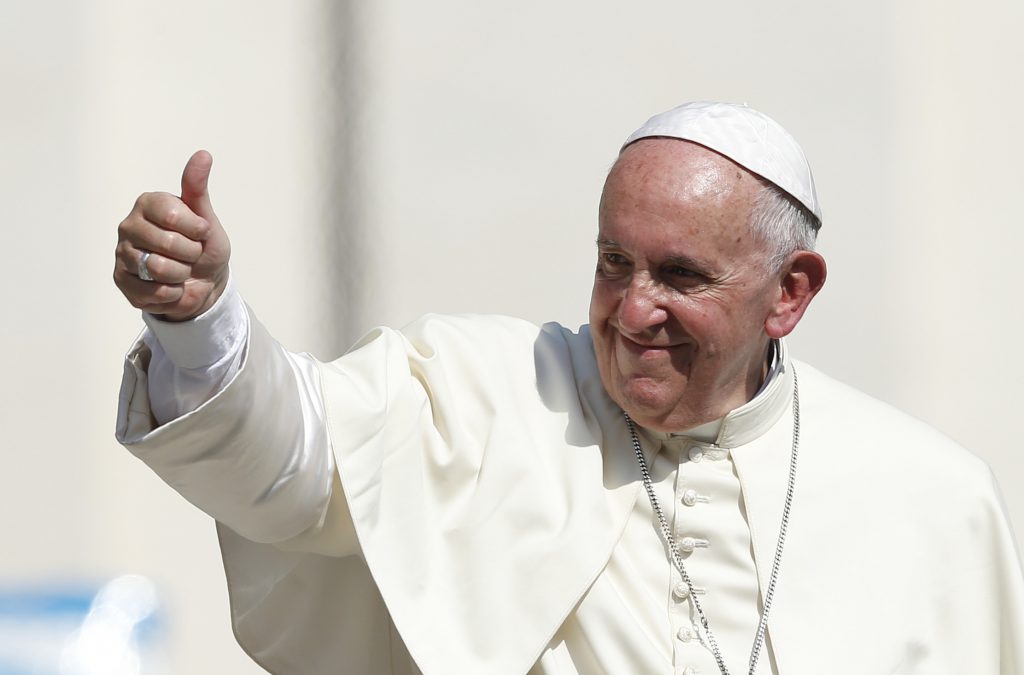Defending Pope Francis – Pt. 3 The Feeding Frenzy

Over the last year or so, I have received numerous emails and all manner of communique from not a few friends and colleagues of mine, some with letters both in front and behind their names, attacking Pope Francis in ways that absolutely puzzled me. Some of these amount to frenetic ravings against our Holy Father with so little intellectual foundation that I had to ask myself again and again, “What is going on here?”
The only way I can make sense out of this is to conclude there is a growing tendency among some on “the right” (and I use that term in the best sense, meaning, they are desiring to remain in union with the teachings of the Church) to interpret every word Pope Francis says in the most negative way possible. This is extremely disturbing to me. There is a veritable feeding frenzy going on that is unhealthy and it is coming from the most unlikely sources.
Pope Francis is not St. John Paul the Great, nor is he Benedict XVI. He is not their equals in either philosophy or theology. I get that. And I am not a fan of his off-the-cuff interviews where he says things that are ambiguous and confusing at times. But folks, that is just going to happen from time to time over the years in Church history. All Popes are not going to be at the same intellectual level. But when I look at all of the good this pope is accomplishing in reaching out to the poor, and the sick. His emphasis on living modestly, and on evangelism, I think, “Why don’t we hear anything at all about this from these folks who claim to be so ‘orthodox’?” There is much to like about Pope Francis.
I believe Pope Francis will be remembered as the Pope of Mercy. He is reaching out not only to the sick, and the poor, but he is reaching out pastorally in new and profound ways to those on “the fringe right,” the SSPX in particular. And he is reaching out to those who are struggling with sin in their lives, and in various ways, as I talked about in my last two posts concerning Amoris Laetitia. And I do believe both are to be commended. Our Holy Father is a good man who is traversing very difficult waters in very difficult times for our Church around the world. I pray all of us are in prayer daily for guidance and wisdom from the Holy Spirit so that Pope Francis might continue to steer the barque of Peter well in these perilous times.
But at any rate, let me get to the latest example of the “feeding frenzy” that I mentioned above. I have received from numerous people, as I also said above, the claim that the Pope is somehow against evangelism and apologetics.
I kid you not.
And these emails and messages have come with all sorts of dire warnings of just how “dark” and “contrary to the Faith” the pope’s teachings on evangelism and apologetics really are.
And just so you know, let me be clear. The pope, that is, the Catholic Pope, is claimed to be against both apologetics and evangelism. One fellow pointed out to me, “That doesn’t bode well for someone like you, Tim, who is ‘Director of Apologetics and Evangelization’ for Catholic Answers!”
Oy vey!
And what is the source of these claims? Well, there are multiple. One was a statement that Pope Francis made; actually, a couple of sentences he said, to a group of German pilgrims, mostly Lutherans, last October, in Rome. The Pope is quoted as having said that “proselytism is a potential threat to Christian unity.” And in that context he then said, “The last thing you must do is ‘to say, to convince’. It’s not right to convince someone of your faith.” And, then, he said, “Proselytism is the strongest venom against the path of ecumenism.”
The context here is so obvious that it hardly seems worth responding to. And I wouldn’t if it were not for the fact that I keep getting emails questioning whether “the pope is Catholic.”
The context is very clear that Pope Francis is not talking about “evangelism.” He does not use the term. He is referring to “prosyletism,” which is a term that has developed in the Church in the last half a century or more to mean the use of illicit means, dishonesty, coercion, or overly aggressive means in order to propogate the Faith. It is basically attempting to “convince” people by your own means rather than by the means of the Gospel and the power of God’s word. Yes, folks, there are rules when evangelizing! It’s not a free-for-all!
For those accusing the pope of condemning evangelism and apologetics, I only ask: Have you read Pope Francis’s magisterial teachings on these matters? Can we at least agree that we should interpret the pope as best we can consonant with his own teachings, not to mention, the entire analogy of the Faith?
Here’s my challenge to all who accuse the pope of being “un-Catholic.” Please read his first Apostolic Exhortation Evangelii Gaudium and then tell me he is against evangelism. I double-dog dare you! If you have an honest bone in your body, you will not be able to say that. In this magisterial document, the pope extols evangelism everywhere and to everyone without exception a la Pope Paul VI!
For those who have not read it, I will provide here a few excerpts. And when you read them notice the progression from the Pope reminding us of our calling to evangelize Catholics, to all of the baptized, whether they have a relationship with the Church or not, to unbelievers. That covers the gamut, folks! That is Catholic Answers’s mission statement in a magisterial document! And it should be all of our individual missions in life as baptized Catholics.
III. The new evangelization for the transmission of the faith
14. Attentive to the promptings of the Holy Spirit who helps us together to read the signs of the times, the XIII Ordinary General Assembly of the Synod of Bishops gathered from 7-28 October 2012 to discuss the theme: The New Evangelization for the Transmission of the Christian Faith. The Synod reaffirmed that the new evangelization is a summons addressed to all and that it is carried out in three principal settings.
15. In first place, we can mention the area of ordinary pastoral ministry, which is “animated by the fire of the Spirit, so as to inflame the hearts of the faithful who regularly take part in community worship and gather on the Lord’s day to be nourished by his word and by the bread of eternal life”. In this category we can also include those members of the faithful who preserve a deep and sincere faith, expressing it in different ways, but seldom taking part in worship. Ordinary pastoral ministry seeks to help believers to grow spiritually so that they can respond to God’s love ever more fully in their lives.
A second area is that of “the baptized whose lives do not reflect the demands of Baptism”, who lack a meaningful relationship to the Church and no longer experience the consolation born of faith. The Church, in her maternal concern, tries to help them experience a conversion which will restore the joy of faith to their hearts and inspire a commitment to the Gospel.
Lastly, we cannot forget that evangelization is first and foremost about preaching the Gospel to those who do not know Jesus Christ or who have always rejected him. Many of them are quietly seeking God, led by a yearning to see his face, even in countries of ancient Christian tradition. All of them have a right to receive the Gospel. Christians have the duty to proclaim the Gospel without excluding anyone. Instead of seeming to impose new obligations, they should appear as people who wish to share their joy, who point to a horizon of beauty and who invite others to a delicious banquet. It is not by proselytizing that the Church grows, but “by attraction”.
John Paul II asked us to recognize that “there must be no lessening of the impetus to preach the Gospel” to those who are far from Christ, “because this is the first task of the Church”. Indeed, “today missionary activity still represents the greatest challenge for the Church” and “the missionary task must remain foremost”. What would happen if we were to take these words seriously? We would realize that missionary outreach is paradigmatic for all the Church’s activity. Along these lines the Latin American bishops stated that we “cannot passively and calmly wait in our church buildings”; we need to move “from a pastoral ministry of mere conservation to a decidedly missionary pastoral ministry”. This task continues to be a source of immense joy for the Church: “Just so, I tell you, there will be more joy in heaven over one sinner who repents than ninety-nine righteous persons who need no repentance” (Lk 15:7).
How could the Pope be clearer?
Notice, he is clearly against “prosyletism,” as all Catholics should be. But he is in favor of evangelizing everyone!
Is the Pope Against Apologetics?
The answer is no. But the claim is made over and over again against Pope Francis in the midst of the feeding frenzy. And why? Because of a talk the Holy Father made when speaking to the Congregation for Bishops exhorting them to choose the best candidates for the episcopacy. If you read what he actually said, Pope Francis made some very important points. He urged the bishops to search out “authentic” pastors who display “professionalism, service, and holiness of life.”
Nothing to see here, move along.
He also exhorted the bishops in general to be “guardians of doctrine, not to measure how far the world lives from the truth it contains, but to fascinate the world, to enchant the world with the beauty of love, to seduce it with the free gift of the Gospel.”
Looks good to me.
But here’s the rub. Pope Francis went on to say, “The church doesn’t need apologists for their own agendas or crusaders for their own battles… but humble and faithful sowers of the truth.”
Believe it or not, the line where Pope Francis said, “The church doesn’t need apologists…” was taken out of context to say the pope is “against apologetics.”
Really?
Let me cite for you Evangelii Gaudium, paragraphs 132-134, so you can read what the Pope has written concerning apologetics exercising his magisterial authority:
Proclaiming the Gospel message to different cultures also involves proclaiming it to professional, scientific and academic circles. This means an encounter between faith, reason and the sciences with a view to developing new approaches and arguments on the issue of credibility, a creative apologetics which would encourage greater openness to the Gospel on the part of all. When certain categories of reason and the sciences are taken up into the proclamation of the message, these categories then become tools of evangelization; water is changed into wine. Whatever is taken up is not just redeemed, but becomes an instrument of the Spirit for enlightening and renewing the world.
133. It is not enough that evangelizers be concerned to reach each person, or that the Gospel be proclaimed to the cultures as a whole. A theology – and not simply a pastoral theology – which is in dialogue with other sciences and human experiences is most important for our discernment on how best to bring the Gospel message to different cultural contexts and groups. The Church, in her commitment to evangelization, appreciates and encourages the charism of theologians and their scholarly efforts to advance dialogue with the world of cultures and sciences. I call on theologians to carry out this service as part of the Church’s saving mission. In doing so, however, they must always remember that the Church and theology exist to evangelize, and not be content with a desk-bound theology.
134. Universities are outstanding environments for articulating and developing this evangelizing commitment in an interdisciplinary and integrated way. Catholic schools, which always strive to join their work of education with the explicit proclamation of the Gospel, are a most valuable resource for the evangelization of culture, even in those countries and cities where hostile situations challenge us to greater creativity in our search for suitable methods.
Did you notice how the Holy Father encourages apologetics and the evangelization of each and every person and culture on the planet? That just doesn’t sound to me like he is against apologetics and evangelization. What say you?
I find it truly disturbing that so many would say what they are saying about the Holy Father without having actually read his magisterial teachings on these matters. In the above talk concerning bishops, the pope was not condemning apologetics, he was condemning those who practice an apologetic for their personal “agendas” rather than the Gospel. There is a huge difference here!
Folks, this should not be difficult to see, yet, I can tell you I have been in conversations with numerous people who take the pope to task on these and other matters, but then admit they have not actually read his magisterial teaching. Often, the person attacking the vicar of Christ on earth will admit he has not even read the Pope’s entire statement; rather, just excerpts from some hit piece against the pope.
Honestly, this reminds me of what I used to do before I was Catholic. I would read about the Catholic Church from anti-Catholic sources, rather than read what the Catholic Church actually teaches. Thank God I was challenged by a young Catholic Marine that some of you know, Sgt. Matt Dula, to read what the Catholic Church says about the Catholic Church. The rest is, as they say, history!
The bottom line here is this: If the Pope utters one sentence that may possibly be taken to mean something contrary to just about everything he has written in his magisterial teaching, there are some who just have to conclude that that one sentence, or paragraph, or footnote, could not have any other meaning except that which whichever pundit says it just has to mean!
Is anybody else disturbed by this? Or is it just me?
Folks, what we have here are not a few people, with the best of intentions I would assume, taking one or two sentences, a footnote, etc., out of context from Pope Francis, and creating an allusion that he is saying something that he just did not say.
A Word About Proselytism
In both of the above claims against the Pope, you probably noticed Pope Francis came down very harshly against “proselytism.” Unfortunately, “proselytism” continues to get transmogrified in the minds of many to mean “evangelism” and even “apologetics.” There does seem to be genuine confusion here, so let me clarify.
Proselytism is a term that was once used in the Church interchangeably with evangelism. However, in recent decades proselytism has come to mean something different: using untoward means, manipulation, coercion, overly aggressive tactics, etc. in spreading the Faith. That is what our Holy Father was addressing. And he should address this, of course, because proselytism represents the opposite of what our first pope commanded concerning apologetics and evangelization:
… but in your hearts reverence Christ as Lord. Always be prepared to make a defense to any one who calls you to account for the hope that is in you, yet do it with gentleness and reverence (I Peter 3:15).
A Suggestion to all who read this
Whenever you read Pope Francis seemingly rejecting evangelism as something base, or evil, take a look at the context and you will find him to be condemning proselytism, not evangelism. And if you want to read up on the difference between the two, let me recommend a document promulgated by the Congregation for the Doctrine of the Faith, A Doctrinal Note on Some Aspects of Evangelism, approved by Pope Benedict XVI, on October 6, 2007, and promulgated December 3, 2007.
This document makes the proper distinctions between evangelism and proselytism all Catholics should be familiar with, especially in paragraph 12:
In this connection, it needs also to be recalled that if a non-Catholic Christian, for reasons of conscience and having been convinced of Catholic truth, asks to enter into the full communion of the Catholic Church, this is to be respected as the work of the Holy Spirit and as an expression of freedom of conscience and of religion. In such a case, it would not be a question of proselytism in the negative sense that has been attributed to this term. As explicitly recognized in the Decree on Ecumenism of the Second Vatican Council, “it is evident that the work of preparing and reconciling those individuals who desire full Catholic communion is of its nature distinct from ecumenical action, but there is no opposition between the two, since both proceed from the marvelous ways of God”. Therefore, the work of ecumenism does not remove the right or take away the responsibility of proclaiming in fullness the Catholic faith to other Christians, who freely wish to receive it.
This perspective naturally requires the avoidance of any undue pressure: “in spreading religious faith and introducing religious practices, everyone should refrain at all times from any kind of action which might seem to suggest coercion or dishonest or improper persuasion, especially when dealing with poor or uneducated people”. The witness to the truth does not seek to impose anything by force, neither by coercive action nor by tactics incompatible with the Gospel. By definition, the exercise of charity is free. Love and witnessing to the truth are aimed above all at convincing others through the power of the word of God (Cf. 1 Cor 2:3-5; 1 Thess 2:3-5). The Christian mission resides in the power of the Holy Spirit and in the truth itself which is proclaimed.
And, very importantly, we find in footnote #49:
The term proselytism originated in the context of Judaism, in which the term proselyte referred to someone who, coming from the gentiles, had passed into the Chosen People. So too, in the Christian context, the term proselytism was often used as a synonym for missionary activity. More recently, however, the term has taken on a negative connotation, to mean the promotion of a religion by using means, and for motives, contrary to the spirit of the Gospel; that is, which do not safeguard the freedom and dignity of the human person. It is in this sense that the term proselytism is understood in the context of the ecumenical movement…
If all reading this will make a commitment to give the Holy Father, or anyone else for that matter, the benefit of the doubt when coming upon a sentence taken from a talk, interview, etc., we could go a long way toward healing the rifts that are being caused by what has become an often incoherent venom toward our Holy Father.
I can sympathize when it comes to genuine confusion that may have been caused by ambiguous statements. I get that. But I do not excuse the confused pushing their own confusion upon others, and with a venom that is anything but charitable. This kind of venom only serves to confuse the faithful. I know that here at Catholic Answers, we have a constituency of people who are genuinely fired up for their faith, and not everyone is at the highest level of sophistication. I know I am not. And I have been at this for a long time as a professional apologist (almost 24 years now). I do my best, but I know I am not the sharpest knife in the tray. It is very easy, even tempting, to become a rabble-rouser. It is so easy to take half of a sentence from the pope that seems superficially damning and run with it. But that does not make it any less wrong-even sinful-to do.
Unfortunately, the kind of venom I see out there in the blogosphere and elsewhere, so often rooted in misunderstanding, bad theology, and bad philosophy, often leads some of the faithful into dangerous and bitter waters. I, for one, do not want to either go there myself or lead others there. I will always defend the definitive teaching of the Church, but that never means I have to attack the pope to achieve that end.
What About Papal Blunders?
On the very rare occasion popes make errors – and they do – I personally will leave St. Paul to correct St. Peter. I will let Pope Benedict XII correct John XXIII. And I will leave St. Catherine of Sienna to correct Gregory XI (and the latter was not a case of a doctrinal error at all). I tell our apologists at Catholic Answers who are in my charge to send folks to the National Bioethics Center on questions of bioethics that they are unsure about, or to Adoremus.com for liturgy questions, etc. Even though Pope Francis has not taught anything to the universal Church that is, in fact, in error, even if he did, or, if I thought he did, I would simply teach what the Catholic Church teaches and say words to the effect of, “We are waiting for clarification from the Holy See on this, but let me be clear about what the Church actually teaches…” or something like that. Our apologists at Catholic Answers, and I, are simply not in the business of correcting popes.
I truly pray that all of us might consider the words of the great philosopher and theologian, Dirty Harry, who famously said, “A man has got to know his limitations.” I pray all who think about correcting any pope would err on the side of caution and humility rather than rushing in to condemn. I am seeing great prelates in the Church making enormous errors in attempting to correct Pope Francis. Obvious errors. Embarrassing errors. What say you and I determine right now we will not go down that road that is everywhere peppered with the landmines of pride, ego, and just plain lack of understanding.
As St. Ignatius of Loyola pointed out 500 years ago, even in the rare case where a superior can be licitly corrected, often more evil results from the correction than good. The confusion and even scandal that is caused in the lives of God’s “little ones” should at least give us pause (cf. Matt. 18:6). And how many times in history do we see folks who just know the Church and the Pope are wrong get proven wrong themselves?
I’m just sayin’…






